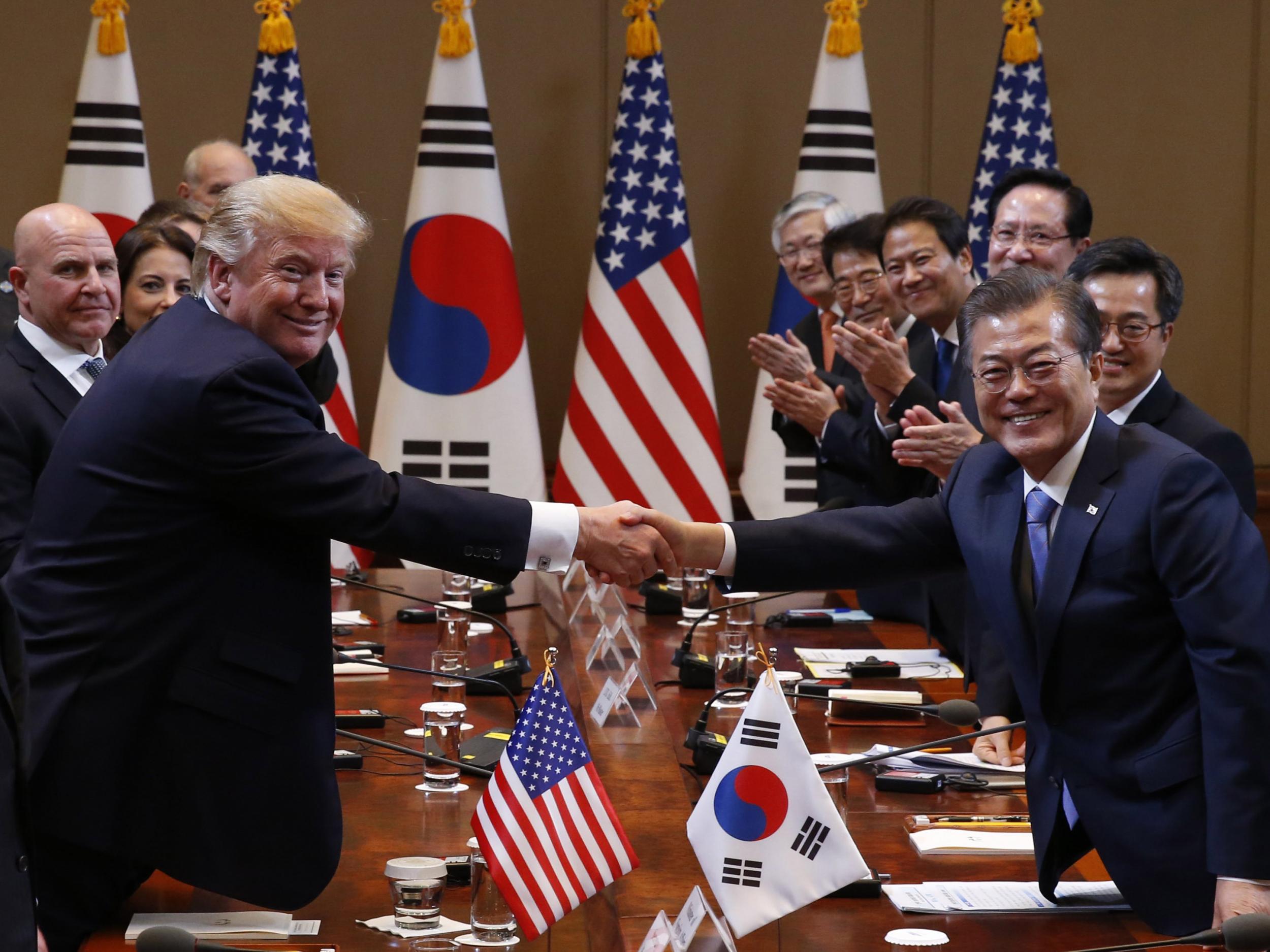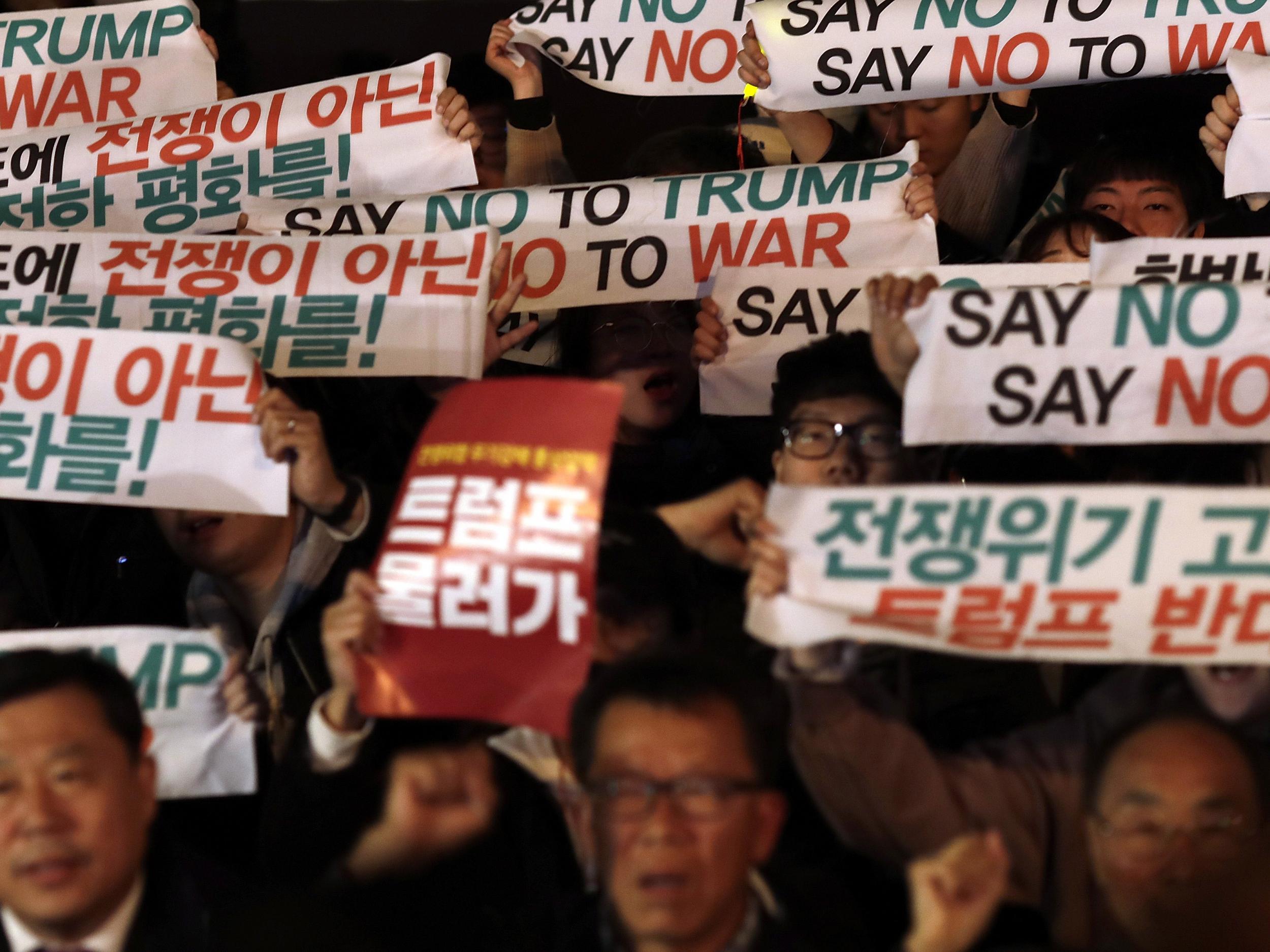Trump's South Korea visit does nothing to calm fears of war with Kim Jong-un
‘I don’t think he’s going to resolve the nuclear issue. He may make it worse’

Your support helps us to tell the story
From reproductive rights to climate change to Big Tech, The Independent is on the ground when the story is developing. Whether it's investigating the financials of Elon Musk's pro-Trump PAC or producing our latest documentary, 'The A Word', which shines a light on the American women fighting for reproductive rights, we know how important it is to parse out the facts from the messaging.
At such a critical moment in US history, we need reporters on the ground. Your donation allows us to keep sending journalists to speak to both sides of the story.
The Independent is trusted by Americans across the entire political spectrum. And unlike many other quality news outlets, we choose not to lock Americans out of our reporting and analysis with paywalls. We believe quality journalism should be available to everyone, paid for by those who can afford it.
Your support makes all the difference.The motorcade carrying President Trump and his entourage sped past mainly older people cheering and waving American and South Korean flags and younger people waving signs saying “Trump Go Home” and “Peace not War.”
It’s unlikely that Trump noticed them as he sped down the avenue for a lavish dinner on Tuesday night with his host, President Moon Jae-in, but the contrast indicated the deep rifts in a society divided between conservatives preferring a hard line against the North and liberals and leftists favouring negotiations, maybe a “peace treaty”, even if North Korea’s leader Kim Jong-un does not forswear his nuclear and missile programme.
The two leaders gave every outward appearance of having reached a meeting of minds in a lengthy summit after which Mr Moon praised the “special bond forged between President Trump and myself”.
Beneath the surface, though, were signs of difference in emphasis if not disagreement. Mr Moon agreed “we must focus on pressure and sanctions”, but Mr Trump carried the message considerably further by noting the presence of three aircraft carriers and a nuclear submarine lurking in nearby waters.
Mr Trump did not talk openly of a “military option” or “preemptive strike”, both of which Mr Moon opposes for fear of inviting attack by North Korea and risking a second Korean War. Still, he left no doubt that those threats were still very much alive while he and his host talked over an enormous weapons deal that Mr Trump said would bring jobs to American workers and help redress South Korea’s enormous trade surplus with the US.
“We make the greatest military equipment in the world,” Mr Trump boasted. “South Korea will be ordering billions of dollars of such equipment.”
As for those warships off the coast, Mr Trump said: “We hope to God we never have to use them,” a remark that only deepened the sense that the day might come when Mr Trump would indeed order a strike on North Korea.
If Mr Moon is noticeably unenthusiastic about going to war with the North, he was still delighted to win Mr Trump’s agreement for South Korea to increase the size and distance of its own missiles. South Korea has been constrained by an agreement with the US that was made years ago to keep the ongoing Korean standoff from escalating into war, but now Mr Moon said the US had removed all constraints.

At the same time, Mr Moon said he and Mr Trump had “agreed to expand rotational deployment” of American forces, meaning US troops can move in and out of Korea for military exercises that invariably provoke threats from North Korea along with vows from Kim Jong-un to conduct more nuclear and missile tests.
Such talk deepens fears on the streets of Seoul that, eventually, the two Koreas will come to blows. The protests today were not nearly as severe as the Candlelight Revolution that led to Mr Moon’s election as President in May in place of the conservative Park Geun-hye, now held in prison and charged with corruption and other offences.
The reason they were relatively mild is that Mr Moon had spread the word that Mr Trump, as his first state guest, should be treated politely, indeed greeted warmly. That reception was extremely disillusioning to many Koreans, a majority of whom do not approve of him as US President and fear he may lead their country into war with the North.
“Of course we have to welcome him,” said Kim Min-young, an office worker taking a break from her job in one of the high-rise buildings overlooking the main avenue to the Blue House, the presidential office and residence where the Trump-Moon summit and state dinner were staged. “He’s our guest.”
Another onlooker on the parade route was less charitable. “Trump is too tough,” said Lee Jee-hong, an office manager. “We do not know what he will do. I don’t think he’s going to resolve the nuclear issue. He may make it worse.”
Among the rightists waving American and Korean flags, the response was totally different. “We love America,” said Chung Ki-tak, in his sixties. “We are brothers. We should smash North Korea.”
Mr Moon left no doubt, while building up South Korea’s military strength, he still dreams of reconciliation with North Korea as he demanded during his election campaign.
“I am very confident we can freeze the nuclear programme,” he said. “We can bring about permanent peace on the peninsula,” he added, even if “this is not the time for a peace treaty” as demanded by the North.
Mr Trump gave the impression that he too hoped for a peaceful solution. “We are trying very hard to solve the problem,” he said. China’s President Xi Jinping “has been very helpful”. He indicated that North Korea would be the prime topic of talks with Mr Xi when he goes to Beijing on Wednesday after delivering a major policy address to South Korea’s national assembly.
“We should be able to resolve the problem quite quickly,” said Mr Trump. “This is a problem that should have been solved a long time ago,” he added – a dig at a long list of American presidents who failed to halt the North’s nuclear programme.
Subscribe to Independent Premium to bookmark this article
Want to bookmark your favourite articles and stories to read or reference later? Start your Independent Premium subscription today.
Join our commenting forum
Join thought-provoking conversations, follow other Independent readers and see their replies
Comments